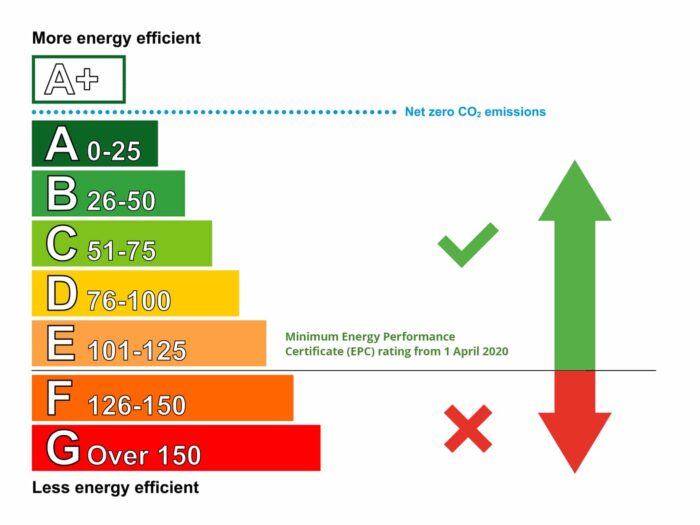EPC Requirements and Minimum Energy Efficiency Standards (MEES) for Rental Properties – What Landlords Need to Know
Since 1st April 2020, landlords are unable to create new tenancies in England and Wales without an EPC rating of E or above. Approximately 6% of UK dwellings might not pass the new rules the new rules, and landlords could be face increased fines. Read on to find out everything you need to know about the current EPC rules and those coming in 2025.
Does a landlord need to renew their EPC if it expired during a tenancy?
A landlord must renew their EPC every ten years, or whenever the certificate expires. If you have had your EPC for less than ten years, you don’t need to renew it. However, if you have had it for more than ten years, you should arrange to have a new one. This way, you will know that the EPC remains valid throughout the tenancy.
Energy efficiency standards came into effect in April 2018. In order to legally let a property, it must have an EPC rating of ‘E’ or higher. If it does not have an EPC, the landlord is liable for criminal and civil penalties, which can amount to £5,000 per property. Landlords must renew their EPC if their existing tenancies have not ended, and new tenancies must be re-let with a current EPC.
Which properties do the EPC rules apply to?
- Domestic properties which are privately rented
- On a lease between 6 months and 99 years
- In England and Wales
- Scotland does have similar legislation in place already
What should I do if my rental property has an EPC rating below E?
If your previous EPC rating was less than an E the first thing to do is get an current EPC performed. You can find a local assessor with the Go Local EPC search tool.
EPC calculations do change regularly and it’s possible that you’ll receive an alternative rating from that you received years ago. If your property’s current EPC rating is lower than an E and you are not satisfied, then you’ll have to improve efficiency to improve your rating prior to letting the property go or renew your contract.
It is likely that your EPC report will contain the recommended actions to improve your home’s energy performance performance. It is essential to implement all of these actions to raise your score, which will be above that of an E rating.
Are any properties exempt from requiring an EPC?
Within England and Wales there are more than one million homes with the EPC rating that is F, or G. This is approximately 6% of homes.
There are a few exceptions to how properties are required to conform with the latest regulations. This will only be the case in a few instances. If any of these apply you may apply to be exempted through the Exemptions Register for the PRS.
- Devaluation: The necessary improvements can result in damage or decrease an asset’s value by 5% or more.
- Consent This means that it can not be achieved to obtain consent for the work to be carried out from the lender, the tenant or the superior landlord.
- Cost: The suggested improvement measures are not cost effective in any way, whether within the payback period of 7 years as well under Green Deal’s Golden Rule.
What are the latest EPC rules for landlords coming into 2022?

The government has suggested the rental property owners require an EPC rating of C or higher by 2025. Similar to prior modifications, the new rules will be put into place to new tenants first, and then for all tenancies beginning in 2028.
The new regulations are expected to increase the efficiency of homes and also reduce carbon emissions in line with the goal set by the government to be net-zero by 2050.
The penalty for failing to have an EPC is also set to increase from £5,000 to £30,000 starting in 2025.
Must I have my tenant’s consent before I can arrange for an energy assessment?
The landlord and the letting agent are required to give tenants 24-hour notice in writing prior to any property visit. Since the requirement for an energy performance assessment and EPC is an obligation of law and a legal requirement, most tenants will be happy to comply however some tenants may wish to be present when the assessor visits.
The tenant must provide their consent to any house visits, unless it’s an emergency situation such as a gas leak.
How do I obtain a new EPC assessment?
Very easily, you can use the Go Local Assessor Search to find a friendly, professional, certified assessor local to you. Simply follow this link, enter whether the proerty is Domestic or Commercial, then the property’s postcode prefix ie the first ‘bit’ of the postcode – FY8, for the full postcode of FY8 3ST and follow the links for their email or phone number and make contact.

